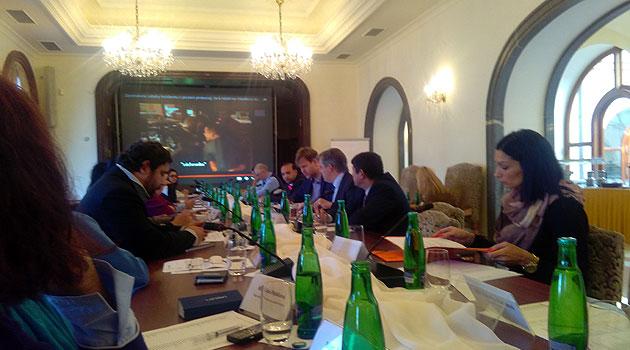Czech Govt Roma Council reviews Romani Holocaust sites, victim database, and compensation for involuntary sterilizations

The Czech Government Council on Romani Minority Affairs met on Tuesday in Prague and discussed much more than just the scandal in Žatec. After opening with a vote of agreement to call on the Interior Ministry and Police Presidium to report to the Council on the investigation there, the Council focused on the opening of the school year in relation to implementation of the amendment to the Schools Act legislating the education of children and pupils with special educational needs.
“We had the opportunity to discuss how the new Schools Act that took effect this September is being implemented,” Jan Kudry, a civil society member of the Council, said. Deputy Education Minister Václav Pícl first recapitulated the information that is already known about the law’s support measures and how they are to be used.
Pícl then explained the purpose of the so-called templates (a software program) for the support measures. He demonstrated how easy it was to complete and file the templates with the ministry.
“The Council disagreed on that point. In practice, we know of situations where schools cannot cope with the templates, to say nothing of the project applications, and they frequently pay no small amount of money to have somebody else do that work, even though that expenditure cannot be covered by the project funding,” Kudry commented to news server Romea.cz.
“Furthermore, we warned the Deputy Education Minister of insufficient capacity in terms of experts who can be compensated through the template program, whether they be psychologists, school assistants, or special needs educators. From the field, we know that these experts are lacking – not just in the schools, but also in the guidance counseling centers,” he said.
It also came to light, in response to these complaints to the ministry, that the Regional Authorities are complaining that they, too, do not have enough qualified human resources available to work with the new system. “We appreciate the new law, and we respect the Deputy Minister’s interest, but in practice, unfortunately, we are encountering not very positive opinions about this ‘new type of education’ among professionals,” Kudry said.
“We greatly regret that such tendencies are coming from many staffers in the educational psychology counseling centers. We believed those professionals would be up to date. This raises questions for us regarding whether Romani children are being diagnosed correctly and objectively by these professionals,” he added.
The rest of the discussion focused on the number of pupils who are to transfer from the “practical” schools into mainstream ones – in this area there is a survey underway and collection of data from each region. Precise numbers should be known roughly in mid-November, but currently an estimated 200 – 250 pupils are believed to have transferred into the mainstream.
The project on the “Database of Romani Holocaust Victims” being implemented by the Terezín Institute Initiative was presented to members of the Council by the director of the Institute, Tereza Štěpková. The aim of the project is to contribute to developing documentation of Romani Holocaust victims and to accumulate and systematize the data about those who were persecuted because of their Romani origin during the Second World War.
Generally speaking, the members of the Council welcomed the initiative, but concerns were raised about the sensitivity of the data contained in the information accumulated and how easily to might be abused. Civil society member Karel Holomek then presented the Brno-based Foundation for Romani Holocaust Remembrance (Nadační fond památníku romského holocaustu), which is now being created and includes former Czech Foreign Minister Karel Schwarzenberg, former Czech Human Rights Minister Michael Kocáb, Romani musician Gejza Horváth and Romani activist Alica Heráková on its board.
The aim of the foundation is to raise money for the reconstruction, rehabilitation or brand new establishment of memorials to the victims of the Romani Holocaust on the territory of the Czech Republic or for renovating and repairing existing memorials. The foundation will continue to strive for the closure or relocation of the buildings and constructions in the village of Lety in the district of Písek that desecrate the existing memorial to the victims of the Romani Holocaust, for establishing memorial plaques at the site of the former “Gypsy” settlement of Hranička in southeastern Moravia between the communities of Kyjov and Svatobořice, and for performing a survey of the possible remembrance occasions and establishing of new remembrance sites for the Romani victims of the Holocaust on Czech territory.
The closing block of the meeting concerned the Council’s Working Groups, especially the Working Group on Illegal Sterilizations. Lucie Fuková, a civil society member of the Council, presented approaches and practices from abroad with respect to compensating the victims of sterilizations performed without a patient’s informed consent.
Fuková illustrated the possible form of such processes based on her knowledge acquired during the June expert meeting with colleagues from abroad during which she attended presentations on various compensation models, e.g., from Norway, Sweden or Switzerland. Another agenda item for discussion in this context was the fact that the compulsory, specialized, pre-attestation course for medical students in the Czech Republic that is currently entitled “Basics of Health Care Legislation, Ethics and Communication” does not include a component on educating physicians to work with ethnicity, multicultural circumstances or religious diversity, etc.